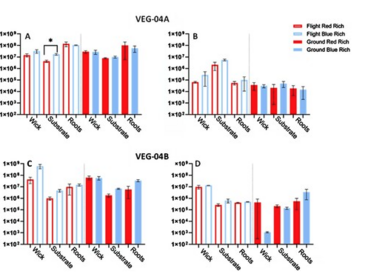Jess M. Bunchek, Mary E. Hummerick, LaShelle E. Spencer, Matthew W. Romeyn, Millennia Young, Robert C. Morrow, Cary A. Mitchell, Grace L. Douglas, Raymond M. Wheeler, Gioia D. Massa
Journal of Plant Interactions 19 (2024): 2292220
doi: 10.1080/17429145.2023.2292220
Fresh, nutritious, palatable produce for crew consumption on long-duration spaceflight missions may provide health-promoting, bioavailable nutrients and enhance the dietary experience. VEG-04A and VEG-04B explored growing leafy greens on the International Space Station using the Veggie Vegetable Production System. Two flight tests with ground controls were conducted in 2019 growing mizuna mustard, where veggie chambers were set to different red-to-blue-to-green light formulations. Light quality affects plant growth, nutrition, microbiology, and organoleptic characteristics on Earth, and we examined how these vary in microgravity and under different harvest scenarios. Astronauts harvested and weighed mizuna and completed organoleptic evaluations. Flight samples were returned to Earth for nutritional quality and microbial food safety analyses. Yield and chemistry differed between soil and flight samples and light treatments, and bacterial and fungal counts were lower in soil than in flight samples. This research helps increase our understanding of the requirements for growing high-quality crops in spaceflight.
© 2024, The Authors, CC BY 4.0

